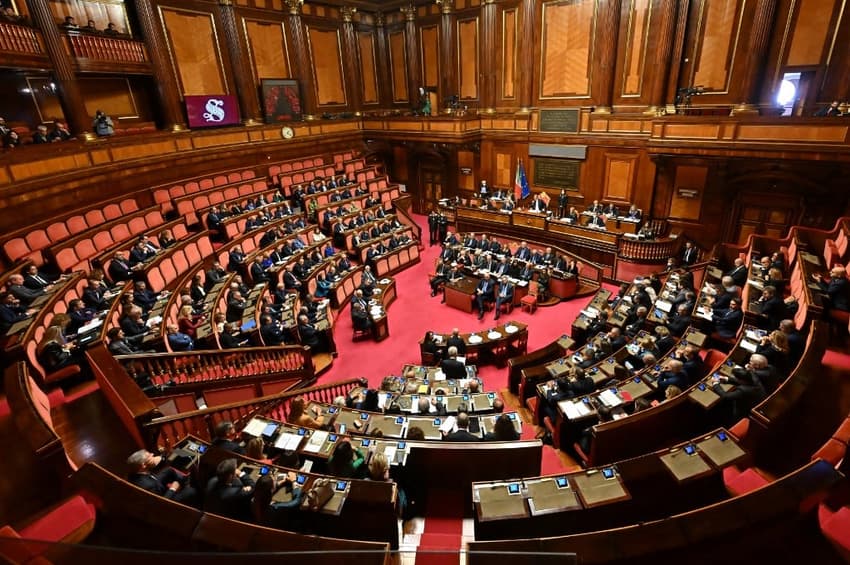Flat tax, superbonus and wild boar: What's in Italy’s 2023 budget?

As parliament races to approve the new budget law by the end of the year, we take a look at what its contents will mean for people living in Italy.
The Italian Senate is rushing to approve the 2023 budget bill before the end of the year, amid controversy over the government's policies on cash payments and outrage over the inclusion of a law allowing wild boar to be hunted in cities.
After a string of delays, the 35-billion-euro package, which includes 21 billion euros of measures to cushion the impact of the energy crisis, is now expected to be approved in a vote on Thursday December 29th.
READ ALSO: EU approves Italy’s 2023 budget despite tax evasion concerns
Debate over the budget has dragged on as parties both in government and opposition continue to push for major changes, with more amendments being proposed on Wednesday.
Silvio Berlusconi’s Forza Italia party is pushing to raise minimum pensions to 1,000 euros a month, reports Italian news agency Ansa, while the Five Star Movement is battling to save some of its flagship 'citizenship income' unemployment benefit, which the government plans to slash.
Here’s what we know so far about the new laws set to come into force under the 2023 budget.
Income tax cut
The budget cuts income tax for people earning up to €35,000 by two percentage points and for those under €20,000 by three points.
The measure is intended to cut the considerable tax burden employees face in Italy, narrowing the gap between the amount workers are paid by their employer and the amount they take home after tax.
Companies hiring women aged under 36 will also benefit from tax exemptions.
Flat tax extended
The budget extends the current flat tax rules for the self-employed.
Freelancers (with a partita IVA) who have an annual income of up to €65,000 can currently benefit from a flat tax rate of 15 percent, or less in some cases.
This will be increased to cover those with an income of up to €85,000 from the start of 2023.
Pension changes
The bill is set to bring in a new system which means people can start claiming their state pension after paying social security contributions for 41 years, no matter what age they are. A previous draft bill set the earliest possible retirement age at 62.
This measure postpones planned wider reforms to the Italian pension system to 2024.
Energy aid measures
As energy prices remain high due to the knock-on effect of the war in Ukraine, energy discounts introduced in 2022 to help offset the rising cost of living will be extended next year.
The new budget is expected to provide energy aid measures for families with an ISEE of up to 15,000 euros (up from 12,000 this year), with funds available under the ‘bonus gas e luce’ until at least the end of March 2023.

Under Italy’s new budget law, 21 billion euros will go to mitigating the effects of the energy crisis on families and businesses. Photo by Ida Marie ODGAARD and Ritzau SCANPIX / AFP
The bill is also set to raise the amount of tax credit (credito d’imposta) businesses can claim under the ‘bonus energetico’.
As of January 1st, owners of heavily energy-consuming businesses (imprese energivore) will be eligible to receive tax credit amounting to as much as 45 percent of their energy-related expenses.
The claimable amount will be set at 35 percent for other businesses.
Major changes to the building ‘superbonus’
Italy’s popular superbonus 110, which has been giving homeowners the chance to claim a tax deduction of up to 110 percent of the cost of home renovation works, has been extended into 2023 – albeit in a reduced form.
READ ALSO: Who can claim Italy’s building superbonus in 2023?
From January, the maximum available rebate will drop from 110 to 90 percent, and the scheme will exclude many of those who were previously eligible to receive the claim.
You can read more about the changes planned for the superbonus HERE.

Italy's superbonus will offer a 90-percent rebate in 2023, down by 20 percent compared to 2022. Photo by Philippe HUGUEN / AFP
Furniture and appliances bonus extended
The 50-percent discount on the purchase of new furniture and energy-efficient appliances for properties which have been renovated will remain available in 2023.
However, the discount will now only be applicable to expenses of 8,000 euros or less (down from the 10,000 euro limit for 2022).
‘Pyschologist bonus’ extended
Italy’s psychologist bonus (bonus psicologo), a voucher for residents looking to access public mental health services, will increase from 600 euros to 1,500 euros in 2023.
The bonus, which was first introduced by Draghi’s government in July 2022, will remain available to residents with an ISEE below 50,000 euros a year.
Changes to ‘culture bonus’ for 18-year-olds
A 500-euro payment made to young people on their 18th birthday to spend on books, museum and cinema tickets and other culture-linked items will be means-tested from 2023.
The existing 18App bonus will be replaced by two new payments: the ‘Carta della Cultura Giovani’ (Youth Cultural Card) and the ‘Merit Card’ (Carta del Merito).
The former will be awarded to 18-year-olds whose households have an ISEE under 35,000 euros, and the latter will go to those who graduated from high school with full marks.
Both bonuses will be worth 500 euros and will be applicable to the purchase of the same items encompassed by the former bonus cultura.
Chance to switch from variable to fixed-rate mortgage
Those with an ISEE lower than 35,000 euros will be able to renegotiate their mortgage, switching from a variable rate to a fixed rate - likely to be an appealing option as interest rates rise..
The offer will only apply to mortgages worth under 200,000 euros, and will not be available to homeowners who are in mortgage arrears.
VAT cut for sanitary pads
The Italian sales tax (IVA) rate on feminine hygiene products and baby products including diapers will be cut from ten to five percent in 2023.
This is the latest cut to the sales tax rate applied to sanitary pads, which were until 2020 subject to 22 percent VAT on par with wine and cigarettes.

Photo by FRANCOIS LO PRESTI / AFP
Unemployment benefit cut
From 2023, the government will cut the amount of unemployment benefit available to those who are deemed capable of working.
This means able-bodied people aged between 18 and 59 will only be able to claim Italy’s unemployment benefits scheme, the so-called reddito di cittadinanza, for a maximum of seven months.
Anyone rejecting what the government calls an ‘adequate' job offer (offerta di lavoro congrua) will immediately have the benefit stopped
The scheme will remain available to those who are unable to work due to disability.
The benefit is expected to be fully scrapped in 2024, but it isn’t clear what - if anything - the government intends to replace it with.
Tax amnesty
Tax debts of under €1,000 incurred between 2000 and 2015 will be written off as of March 31st, 2023.
Wild boar cull in cities
A somewhat unexpected inclusion in the budget bill, a recent amendment will allow for the hunting of wild boar in cities across Italy.
A bid by left-wing and green parties to have the controversial law removed from the budget was defeated on Thursday.
The amendment, which also allows for people to eat the animals they kill, was passed.
Separately, regional authorities said they would set up courses to train hunters in shooting or trapping the boar.

Italian lawmakers plan to allow hunting in cities as they say wild boar pose a risk to motorists. (Photo by Alberto PIZZOLI / AFP)
Cash payment limit raised
The limit on payments made in cash will be raised from the current 2,000 euros to 5,000 euros starting from January 1st 2023.
The government initially planned to increase the limit to €10,000, under changes it said were designed to "help the poor".
The European Commission criticised Rome’s push to increase the limit for cash payments, saying it was contrary to efforts to fight tax evasion.
U-turn on card payment limit
As for what won't be included in the bill: the government has abandoned a long-debated plan to allow merchants to refuse payment by card for amounts under 60 euros following pressure from the European Commission, which said the change would jeopardise efforts to fight tax evasion.
This means shops, cafes and bars will not have the right to refuse cards and demand cash payment, and will continue to face fines if they do so.
The measure had been included in the first budget law draft, and the move, along with the raised cash payment limit, was widely criticised as a “gift to tax dodgers”.
Fuel discounts to expire
Barring any last-minute amendments to the budget, the current discounts on fuel duties – 18.3 cents on every litre of petrol or diesel – will expire on December 31st.
The discounts, originally introduced under Mario Draghi’s tenure, had already been halved on December 1st.
Comments
See Also
The Italian Senate is rushing to approve the 2023 budget bill before the end of the year, amid controversy over the government's policies on cash payments and outrage over the inclusion of a law allowing wild boar to be hunted in cities.
After a string of delays, the 35-billion-euro package, which includes 21 billion euros of measures to cushion the impact of the energy crisis, is now expected to be approved in a vote on Thursday December 29th.
READ ALSO: EU approves Italy’s 2023 budget despite tax evasion concerns
Debate over the budget has dragged on as parties both in government and opposition continue to push for major changes, with more amendments being proposed on Wednesday.
Silvio Berlusconi’s Forza Italia party is pushing to raise minimum pensions to 1,000 euros a month, reports Italian news agency Ansa, while the Five Star Movement is battling to save some of its flagship 'citizenship income' unemployment benefit, which the government plans to slash.
Here’s what we know so far about the new laws set to come into force under the 2023 budget.
Income tax cut
The budget cuts income tax for people earning up to €35,000 by two percentage points and for those under €20,000 by three points.
The measure is intended to cut the considerable tax burden employees face in Italy, narrowing the gap between the amount workers are paid by their employer and the amount they take home after tax.
Companies hiring women aged under 36 will also benefit from tax exemptions.
Flat tax extended
The budget extends the current flat tax rules for the self-employed.
Freelancers (with a partita IVA) who have an annual income of up to €65,000 can currently benefit from a flat tax rate of 15 percent, or less in some cases.
This will be increased to cover those with an income of up to €85,000 from the start of 2023.
Pension changes
The bill is set to bring in a new system which means people can start claiming their state pension after paying social security contributions for 41 years, no matter what age they are. A previous draft bill set the earliest possible retirement age at 62.
This measure postpones planned wider reforms to the Italian pension system to 2024.
Energy aid measures
As energy prices remain high due to the knock-on effect of the war in Ukraine, energy discounts introduced in 2022 to help offset the rising cost of living will be extended next year.
The new budget is expected to provide energy aid measures for families with an ISEE of up to 15,000 euros (up from 12,000 this year), with funds available under the ‘bonus gas e luce’ until at least the end of March 2023.

The bill is also set to raise the amount of tax credit (credito d’imposta) businesses can claim under the ‘bonus energetico’.
As of January 1st, owners of heavily energy-consuming businesses (imprese energivore) will be eligible to receive tax credit amounting to as much as 45 percent of their energy-related expenses.
The claimable amount will be set at 35 percent for other businesses.
Major changes to the building ‘superbonus’
Italy’s popular superbonus 110, which has been giving homeowners the chance to claim a tax deduction of up to 110 percent of the cost of home renovation works, has been extended into 2023 – albeit in a reduced form.
READ ALSO: Who can claim Italy’s building superbonus in 2023?
From January, the maximum available rebate will drop from 110 to 90 percent, and the scheme will exclude many of those who were previously eligible to receive the claim.
You can read more about the changes planned for the superbonus HERE.

Furniture and appliances bonus extended
The 50-percent discount on the purchase of new furniture and energy-efficient appliances for properties which have been renovated will remain available in 2023.
However, the discount will now only be applicable to expenses of 8,000 euros or less (down from the 10,000 euro limit for 2022).
‘Pyschologist bonus’ extended
Italy’s psychologist bonus (bonus psicologo), a voucher for residents looking to access public mental health services, will increase from 600 euros to 1,500 euros in 2023.
The bonus, which was first introduced by Draghi’s government in July 2022, will remain available to residents with an ISEE below 50,000 euros a year.
Changes to ‘culture bonus’ for 18-year-olds
A 500-euro payment made to young people on their 18th birthday to spend on books, museum and cinema tickets and other culture-linked items will be means-tested from 2023.
The existing 18App bonus will be replaced by two new payments: the ‘Carta della Cultura Giovani’ (Youth Cultural Card) and the ‘Merit Card’ (Carta del Merito).
The former will be awarded to 18-year-olds whose households have an ISEE under 35,000 euros, and the latter will go to those who graduated from high school with full marks.
Both bonuses will be worth 500 euros and will be applicable to the purchase of the same items encompassed by the former bonus cultura.
Chance to switch from variable to fixed-rate mortgage
Those with an ISEE lower than 35,000 euros will be able to renegotiate their mortgage, switching from a variable rate to a fixed rate - likely to be an appealing option as interest rates rise..
The offer will only apply to mortgages worth under 200,000 euros, and will not be available to homeowners who are in mortgage arrears.
VAT cut for sanitary pads
The Italian sales tax (IVA) rate on feminine hygiene products and baby products including diapers will be cut from ten to five percent in 2023.
This is the latest cut to the sales tax rate applied to sanitary pads, which were until 2020 subject to 22 percent VAT on par with wine and cigarettes.

Unemployment benefit cut
From 2023, the government will cut the amount of unemployment benefit available to those who are deemed capable of working.
This means able-bodied people aged between 18 and 59 will only be able to claim Italy’s unemployment benefits scheme, the so-called reddito di cittadinanza, for a maximum of seven months.
Anyone rejecting what the government calls an ‘adequate' job offer (offerta di lavoro congrua) will immediately have the benefit stopped
The scheme will remain available to those who are unable to work due to disability.
The benefit is expected to be fully scrapped in 2024, but it isn’t clear what - if anything - the government intends to replace it with.
Tax amnesty
Tax debts of under €1,000 incurred between 2000 and 2015 will be written off as of March 31st, 2023.
Wild boar cull in cities
A somewhat unexpected inclusion in the budget bill, a recent amendment will allow for the hunting of wild boar in cities across Italy.
A bid by left-wing and green parties to have the controversial law removed from the budget was defeated on Thursday.
The amendment, which also allows for people to eat the animals they kill, was passed.
Separately, regional authorities said they would set up courses to train hunters in shooting or trapping the boar.

Cash payment limit raised
The limit on payments made in cash will be raised from the current 2,000 euros to 5,000 euros starting from January 1st 2023.
The government initially planned to increase the limit to €10,000, under changes it said were designed to "help the poor".
The European Commission criticised Rome’s push to increase the limit for cash payments, saying it was contrary to efforts to fight tax evasion.
U-turn on card payment limit
As for what won't be included in the bill: the government has abandoned a long-debated plan to allow merchants to refuse payment by card for amounts under 60 euros following pressure from the European Commission, which said the change would jeopardise efforts to fight tax evasion.
This means shops, cafes and bars will not have the right to refuse cards and demand cash payment, and will continue to face fines if they do so.
The measure had been included in the first budget law draft, and the move, along with the raised cash payment limit, was widely criticised as a “gift to tax dodgers”.
Fuel discounts to expire
Barring any last-minute amendments to the budget, the current discounts on fuel duties – 18.3 cents on every litre of petrol or diesel – will expire on December 31st.
The discounts, originally introduced under Mario Draghi’s tenure, had already been halved on December 1st.
Join the conversation in our comments section below. Share your own views and experience and if you have a question or suggestion for our journalists then email us at [email protected].
Please keep comments civil, constructive and on topic – and make sure to read our terms of use before getting involved.
Please log in here to leave a comment.